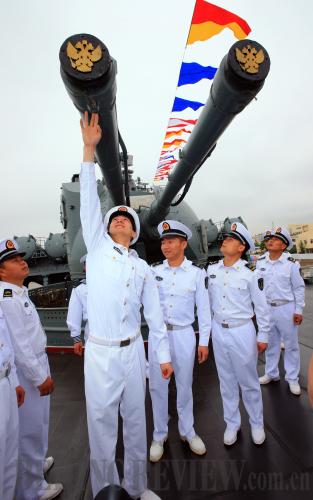|
 |
|
OPEN ARMS: Crew members of China's Zhengzhou missile destroyers visit Russia's Varyag missile cruiser in Shanghai on May 19 (ZHA CHUNMING) |
According to statistics from the CNPC, natural gas consumption in China reached 167.6 billion cubic meters in 2013, up 13.9 percent year on year, and the annual growth rate is estimated to be 10 percent in the next few years due to the country's need for clean energy to tackle air pollution and pursue sustainable development. The gas deal with Russia will satisfy China's energy demands.
Professor Yang Chuang of the China Foreign Affairs University said bilateral cooperation in natural gas is a project of long-term strategic significance. The cooperation meets the two countries' common interests, said Yang, and will drive bilateral cooperation in other fields.
Security ties
Another highlight of Putin's state visit to China had to do with bilateral security cooperation, as Beijing and Moscow promoted military mutual trust. China and Russia began joint naval drills in the East China Sea off Shanghai on May 20, with presidents of the two countries attending the launch of the naval exercise.
The rehearsal demonstrated the new level of strategic mutual trust and coordination between the two countries, said Xi, stressing the joint exercise would showcase the two sides' resolve in responding to threats and challenges as well as safeguarding regional security and stability. Putin agreed that closer military ties are an important part of the bilateral comprehensive strategic partnership.
A total of 14 vessels, two submarines, nine fixed-wing aircraft as well as helicopters and Special Forces took part in the weeklong "Joint Sea-2014" exercise. Both China and Russia dispatched ships, including China's Zhengzhou and Ningbo missile destroyers and Russia's Varyag missile cruiser. This was the third China-Russia joint naval exercise after joint drills off the coast of Russia's Far East in July 2013 and the Yellow Sea in April 2012.
"This is a clear show of enhanced mutual trust between the two militaries, and of increased transparency," said Li Shuyin, a research fellow with the Academy of Military Sciences of the Chinese People's Liberation Army. He added that the exercise also highlighted that the strategic partnership between Beijing and Moscow has reached a new high.
All Chinese and Russian vessels were merged into three different groups, and commanded by both Chinese and Russian commanders so as to enhance coordination between the two navies. The exercise simulated anchorage defense, maritime assaults, anti-submarine combat, air defense as well as identification, rescue and escort missions.
China and Russia also decided to jointly celebrate the 70th anniversary of the defeat of the Nazis in 2015.
China and Russia are unanimous in opposing attempts to distort the World War II record, said Putin, who stressed those attempts are unacceptable and the consequences are dangerous.
According to Putin, China and Russia have been actively advocating the creation of a new security and sustainable development framework in the Asia-Pacific region, which is based on principles such as equality, abiding by international laws, and non-use or non-threatening use of violence.
"High-level mutual trust is a key trait in bilateral ties as it facilitates the two sides' mutually beneficial cooperation in a variety of spheres, including regional security and stability," said Qu of the CIIS. He concluded that by building a relationship based on equality, trust, mutual support, common prosperity and long-lasting friendship, China and Russia are building an example of relations between major countries across the world.
Email us at: dingying@bjreview.com | 